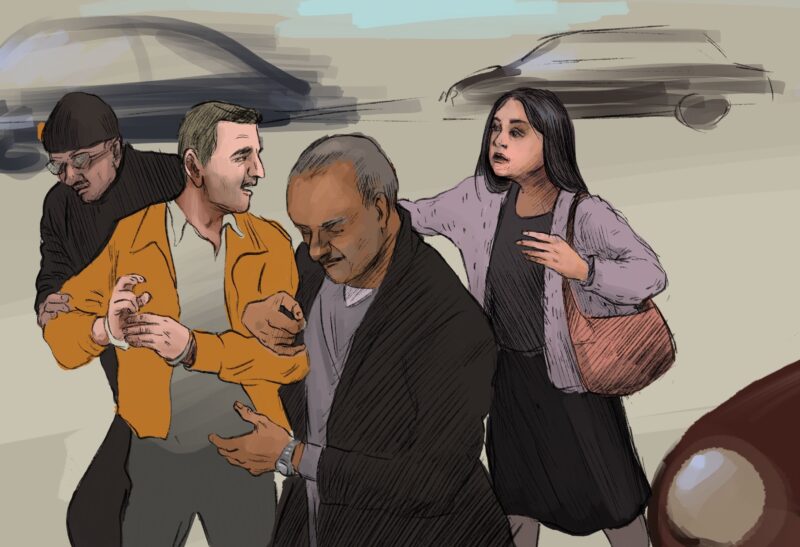The sudden decision of the Azerbaijani authorities to hold an early presidential election has outraged the opposition, but how can they express their dissent? Perhaps only by protesting abroad. But when political emigres raise their voices, their families in Azerbaijan are punished in their place – threatened, persecuted, arrested and even tortured.
Azerbaijani opposition activists have launched a protest unprecedented in terms of еру public reaction to it: not only Azerbaijanis living in Europe have joined the campaign, but also dissenters in other countries and even other continents – Azerbaijani emigrants in the United States, Australia and Africa.
New flare-up
If a presidential election were scheduled in accordance with the constitution, it would be held on the third Wednesday of October this year. However, on 5 February, the president issued a sudden decree to push the election six months forward – to 11 April.
The opposition never had much of a chance anyway, but the rescheduling of the election reduced it to zero altogether.
The Azerbaijani government usually responds predictably to protests – it arrests all those involved. However, this time round, it has had to increase pressure on the relatives of those who are protesting abroad. Relatives of those emigres who left Azerbaijan a long time ago are persecuted now, too.
All main opposition forces have said they would boycott the election: the Musavat party, the Popular Front of Azerbaijan Party, and the civil movement REAL. They also organized a protest rally held in Baku on 10 March.
Emigres have expressed their dissent, too – a protest movement, called “Let’s talk about the dictator,” began in many European countries in February. It aims to circulate information about lawlessness in Azerbaijan and includes a flashmob: protesters hang posters in their communities calling Ilham Aliyev a dictator.
The first target of the Azerbaijani government were the families of activists and organisers of the protest abroad – Tural Sadigli, Mahammad Mirzali (Mirzaliyev) and Ordukhan Teymurkhan. These activists’ relatives were arrested, and there are reports of torture given to them.
Tural
Tural Sadigli is a youth activist who wages an active fight against the regime. In late 2013, he was arrested for participating in a protest and sentenced to 17 days of administrative arrest. When Sadigli came out of prison, he
spoke
about torture he had experienced.
Sadigli decided to leave after his colleague Elvin Kerimov was arrested in January 2014. Together they had run the opposition blog “Azad söz” (Free Speech): “The danger of arrest loomed over me as well, so I had to quickly leave the country in February,” Tural says.
Sadigli continued his fight against the government in 2014 from Germany. Soon after the start of the “Let’s talk about the dictator” protest, on 18 February, Sadigli’s father was detained in the courtyard of the building where he lives. On 22 February, Sadigli’s brother was abducted by unknown people in plainclothes in Baku’s Nasimi district.
“They captured me when I was going home with my wife and took me to a police station. When I asked them to introduce themselves, they alleged that I knew who they were and that we were traitors and enemies of the people,” Elgiz Sadigli, the activist’s brother, told Meydan TV.
The father, Alovsat Sadigli, who had no information about the whereabouts of his son, Elgiz, spent four days visiting all police departments, pre-trial detention facilities and hospitals. He called the police on a daily basis, and on 25 February he was told that a court had sentenced Elgiz to a 30-day administrative arrest for illegal drug trafficking and disobeying the police.
“I was only able to see Elgiz after speaking to the International Committee of the Red Cross. We were allowed to have a short meeting. In those four days, Elgiz had lost, perhaps, 10 kilograms of weight. His clothes were torn,” his father says.
That his son was tortured Alovsat Sadigli found out when Elgiz testified in the court of appeal: “They tried not to leave traces [on his face], they hit him in his stomach and back. They beat him in turns, in groups of four or five, and tortured him with electricity. When Elgiz asked them why they were doing it, he was told: you are traitors of your motherland, this is how we treat those who oppose the state. In the evening after his arrest, before taking him to an expert examination, they made him drink tea. Twenty minutes later, Elgiz felt dizzy and weak, and realised that they had put a narcotic drug in his tea. Later, naturally, the expert examination found the drug in his urine. Elgiz’s condition is still serious because of the beating.”
At approximately the same time, they also tried to influence Tural through another relative. Early on the morning of 20 February, his uncle Zahir Sadigov, a rural resident in Azerbaijan’s Agdam District, was
brought
to the police station.
Alovsat Sadigli (Tural’s father) says that at the police station, police directly demanded that his brother “influence” his nephew who had joined the opposition.
Ordukhan
Another activist, video blogger Ordukhan Teymurkhan, has been living in the Netherlands for 22 years but continues to maintain contact with his homeland:
“Until 2009, I had visited Azerbaijan each year and I simply could not be indifferent to what was happening there. After the Aliyevs came to power, I would take vacations for parliamentary and presidential elections and visit Azerbaijan to attend rallies.”
At one of those rallies, in April 2009, Teymurkhan was arrested for “offering resistance to the police”: “Because of that, my mother had a heart attack and died. Even the Dutch government did not intervene, although I was a citizen of that country. I was told that they could not break business relations with the government of Azerbaijan, and that I should save myself on my own. This meant: pay a bribe and leave. I had to pay a huge bribe.”
After that, Teymurkhan stopped traveling to Azerbaijan. He now holds protests in Europe against corruption and human rights violations, hoping to attract the attention of the world community to those problems. He took part in a famous protest in Strasbourg in 2014 – then, President Aliyev even had to
interrupt
his speech at PACE.
They’ll destroy my parents’ graves
The police arrested two of Ordukhan’s nephews on 17 February. They were also accused of resisting the police and given 30 days of arrest, which they are currently serving.
Alas, there is nothing new about it: Teymurkhan says that pressure on his relatives was exerted previously as well. For example, some of his relatives had in previous years been dismissed or expelled from universities. “After one of the protests, they threatened me that they would destroy my parents’ graves.”
In February 2017, the authorities did not confine themselves to arresting the bloggers’ nephews. They also brought his other relatives to the police, including women and even a two-year-old child.
Mahammad
Mahammad Mirzali (Mirzaliyev) has lived in France since 2016. He is a member of the opposition Popular Front of Azerbaijan Party. Mahammad was arrested together with his father at a protest in 2013. Both were tortured in prison. In 2016, Mirzali left, fearing a new arrest.
Now he administers the Facebook page “Made in Azerbaijan”, on which he, along with Ordukhan Teymurkhan and Tural Sadigli, does live broadcasts and shares his views about political processes in the country.
Influence Mahammad
Mahammad Mirzali’s father and brother-in-law were arrested in January 2018.
“Then, we shared a cartoon titled ‘Azerbaijanis who are dependent on jackals’ on the page ‘Made in Azerbaijan’. I was told to immediately remove the cartoon and then film a video with apologies to the president,” Mahammad said, explaining why pressure was exerted on his family.
Otherwise, his detained relatives were told at the police station, the authorities will have to ‘put all Mirzalievs in jail’,” said a family member who wished to remain anonymous.
Mahammad’s father was released one day after he was detained, and his brother-in-law was released six days later. In February, his brother-in-law was arrested again and sentenced to 30 days of arrest on charges of resisting the police and is now in jail.
How relatives react
Alovsat Sadigli says that he will never give up on his son and will always support him, no matter what happens.
However, not all of the activist’s relatives agree to give him unconditional support.
The demand of a public disownment of an unwanted relative is one of the tests in the arsenal of the Azerbaijani government. For example, Ordukhan’s relatives failed to pass it: they officially declared recently that they
disowned
him.
Mirzaliyev’s father has not disowned his son, but one of Mahammad’s sisters and other relatives broke off their contact with him.
These “sanctions”, however, failed to stop the flashmob “Let’s talk about the dictator”. On the contrary, the inspirers of this protest managed to even expand it into a new movement (still unnamed), which more and more Azerbaijani emigrants dispersed across the world have been joining. “Azerbaijanis living in many countries of the world have joined us. As a sign of solidarity, they have been sending in videos and photos from Australia, the United States, Kuwait and even Africa. We have not met any of them, none of them has a political affiliation. These are ordinary people, many of whom left even for other reasons than political. We saw that it was already necessary to turn it into a movement, an organisation, and to hold these campaigns and protests in other forms,” Tural Sadigli says.
And then, maybe, this protest will take shape as a new wave that will succeed in bringing change to Azerbaijan.



